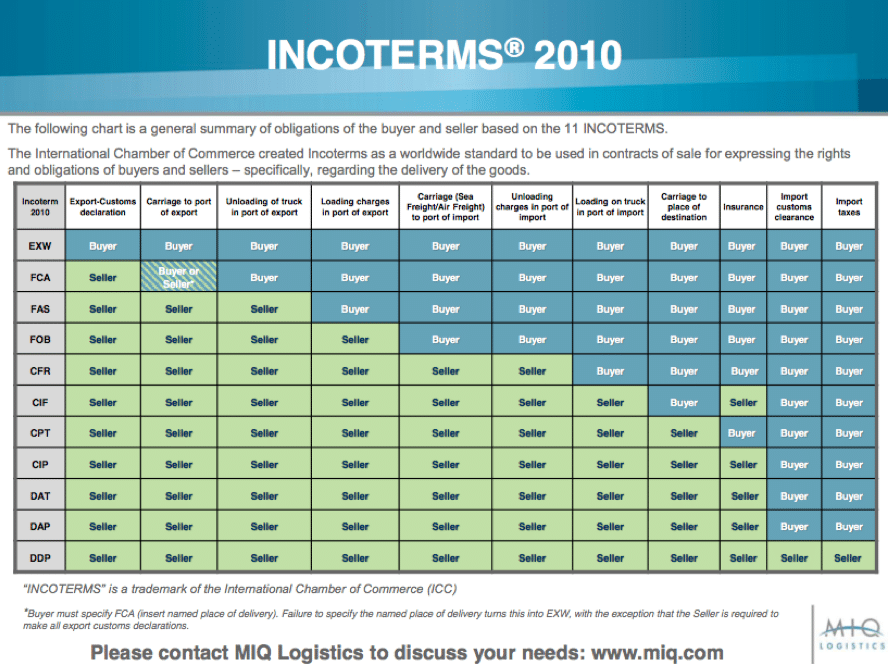Explanation of INCOTERMS
The International Chamber of Commerce (ICC ) published the 8th and current version of its International Commercial Terms, also known as INCOTERMS® on January 1, 2011. As of 2014, we are not aware of any edits to the current version.
The revised rules, originally designated “INCOTERMS 2010“, contain a series of changes, such as a reduction in the number of terms to 11 from 13. The DAF, DES, DEQ, and DDU designations have been eliminated, while two new terms, Delivered at Terminal (DAT) and Delivered at Place (DAP), have been added. INCOTERMS 2010 also attempt to better take into account the roles cargo security and electronic data interchange now play in international trade.
Paul Fitzpatrick, Managing Director of Global Trade Management, released a video excerpt about INCOTERMS as part of a multi video lecture series. You can watch the video now:
If you would like the full video presentation or more details on other trade video topics, please email us at contact_us@miq.com.
View INCOTERMS 2010 Download Free INCOTERMS PDF
WHAT INCOTERMS ARE
INCOTERMS are a set of three-letter standard trade terms most commonly used in international contracts for the sale of goods. First published in 1936, INCOTERMS provide internationally accepted definitions and rules of interpretation for most common commercial terms. INCOTERMS are not updated yearly. Those searching for 2016, 2015, or 2014 INCOTERMS should be directed towards the latest 2010 version. In the US, INCOTERMS are increasingly used in domestic sales contracts rather than UCC shipment and delivery terms.
WHAT INCOTERMS DO
INCOTERMS inform the sales contract by defining the respective obligations, costs and risks involved in the delivery of goods from the Seller to the Buyer.
WHAT INCOTERMS DO NOT DO
INCOTERMS by themselves DO NOT:
- Constitute a contract;
- Supersede the law governing the contract;
- Define where title transfers; nor,
- Address the price payable, currency or credit terms.
These items are defined by the express terms in the sales contract and by the governing law.
PRACTICE POINTS
- BE SPECIFIC:
- If you use INCOTERMS in the Sales Contract or Purchase Order, you should identify the appropriate INCOTERM Rule [e.g. FCA, CPT, etc.], state “INCOTERMS 2010” and specify the place or port as precisely as possible. See below for a chart of specific terms.
- RECOGNIZE WHERE THE RISK OF LOSS TRANSFERS:
- A common misconception when the Seller pays the freight is that the Seller has the risk of loss until the goods are delivered to the place or port specified on the bill of lading or airway bill. Actually, when using INCOTERMS CPT, CIP, CFR or CIF, risk transfers to the Buyer when the Seller hands the goods over to the carrier at origin, not when the goods reach the place or port of destination.
- Understand that under CIP and CIF, the Seller is only obliged to obtain insuranceon minimum cover.
- UNDERSTAND WHO HAS RESPONSIBILITY FOR LOADING AND UNLOADING CHARGES. FOR EXAMPLE:
- DAT obliges the Seller to place the goods at the Buyer’s disposal after unloading at the named terminal at port or place of destination.
- DAP and DDP oblige the Seller to place the goods at the Buyer’s disposal on the delivering carrier ready for unloading at the named place of destination.
- CPT, CIP, CFR or CIF on the other hand, require the parties to identify as precisely as possible the point at the agreed port of destination because the costs up to that point are for the account of the Seller.
- Under FCA terms, the seller satisfies his obligation to deliver when he has handed over the goods, cleared for export, into the charge of the carrier named by the buyer at the named place or point. The buyer is responsible for inland freight, unloading at port of embarkation and loading on ocean carrier/airline.
- UNDERSTAND WHO HAS RESPONSIBILITY FOR U.S. CUSTOMS ENTRY DECLARATIONS:
- DDP is the only INCOTERM where the Seller has responsibility for U.S. Customs entry declarations.
- IMPORTANT NOTE: An important factor to be considered when asking the Seller to be responsible for international carriage, is if the goods ship by Ocean Freight, an Importer Security Filing (ISF) must be electronically submitted to Customs 24 hours before the cargo is laden on the vessel bringing the cargo to the U.S. The Buyer should specify in the contract either (a) the shipper is responsible for the ISF or (b) the Seller is responsible for providing the required data in a timely manner (i.e. 72 hrs before lading) to the Buyer’s appointed agent (e.g. Customs Broker). In practice, when the broker and the international forwarder are unrelated parties, this requirement is honored more in the breach than in the observance. The Buyer responsible for customs entry should indemnify against the penalties (US$5,000) for filing a late, inaccurate or incomplete ISF. The ISF does not apply at this time to airfreight shipments
- DETERMINE THE IMPORTANCE OF SUPPLY CHAIN VISIBILITY
- When CPT, CIP, CFR or CIF are used the Seller fulfills its obligation to deliver when it hands the goods over to the carrier, not when the goods reach the place of destination.
- DAT, DAP and DDP the Seller fulfills its obligation to deliver at the named destination. The Seller has no obligation to provide transit status updates.

